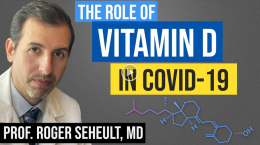Published on December 10, 2021
Video Friday: Vitamin D experts discuss this topic and more, saying “during a pandemic, especially, one should err on the side of encouraging more vitamin D, and avoid vitamin D deficiency at all times”
It’s Video Friday! In today’s video, Dr. Pam Taub, MD and cardiologist at the University of California, San Diego, interviews world-renowned vitamin D experts Dr. Michael Holick and Dr. JoAnn Manson about the current research on vitamin D and how they suggest to apply these findings to daily life during a pandemic. Topics include discussions about cancer, immune health, and COVID-19, what they recommend to their own patients in terms of vitamin D intake and levels, as well as new and upcoming studies. Tune in!
Watch the Video
After watching the video, be sure to make note of our added details below.
Summary: What do Top Researchers Have to Say about the Latest Vitamin D Research?
Vitamin D has a variety of health benefits and actions, from anti-cancer to regulating blood sugar to improving the immune response, regulating cellular growth and controlling the expression of thousands of genes (in other words, much benefit beyond bone health)
Vitamin D deficiency is related to an increased risk for all kinds of diseases
The best biomarker for vitamin D status is the measure of 25(OH)D in the blood – measuring this level is essential to know if you are getting enough
Findings from the VITAL Trial by Manson et al. included a reduction in cancer death among those taking vitamin D supplements; this group was considered “vitamin D sufficient” at baseline on average
A greater risk reduction could be assumed among individuals with vitamin D deficiency to start, however, it is not ethical to do long-term trials in people who are known to be vitamin D deficient, making RCTs to compare outcomes among participants with vitamin D deficiency to vitamin D sufficient participants difficult
What is the optimal amount of vitamin D? VITAL trial showed more than “usual” intake of vitamin D is of benefit in reducing cancer death
Upcoming research includes vitamin D and statin intolerance – improving vitamin D status may decrease complications with muscle aches and pains associated with taking statins. Additional upcoming studies will look at if improving vitamin D status could improve the immune response to COVID vaccines? To long-haul COVID?
COVID data – much data shows higher vitamin D levels are associated with fewer complications and less severity of COVID-19 disease, such as that from the Kauffman study, where a blood level of 20 ng/ml or below vs 34 ng/ml or higher was associated with a 54% higher risk of infection
Vitamin D has an important role to play in immunomodulation, by helping to regulate both the immune response and inflammatory response – many biological mechanisms need vitamin D, especially those involved in fighting a COVID infection
During a pandemic, especially, you should err on the side of encouraging more vitamin D, and should avoid vitamin D deficiency at all times – Dr. Manson
Vitamin D supplementation is SAFE, with no toxicity seen at 10,000 IU/day
It is important to measure the level; obese individuals especially (with a BMI >30) may need more vitamin D than individuals with a normal weight, however, there are many other factors that influence how much vitamin D may be needed
What do they tell their patients to do about vitamin D?
Dr. Holick:
- has patients on 3000-5000 IU/day; 600-1000 IU for children; 1500-2000 IU for teens
- aim for a level between 40-60 ng/ml, up to 100 is perfectly safe
- his blood level is 72 ng/ml taking 6000 IU per day
Dr. Manson:
- Dose recommendations should vary according to health status of the person, and especially during a pandemic, would err on the side of recommending more vitamin D
- 1000-2000 IU per day is perfectly safe, more is reasonable for individuals with certain conditions; there are several other circumstances that would indicate someone may need more vitamin D, and the dose should be adapted to suit a patient’s needs
- clinicians should feel that they have the latitude to decide what is the best dose for their patient
Vitamin D is an Easily Modifiable Factor to Help Improve Disease Outcomes – Check Your Level Today
 Having and maintaining healthy vitamin D levels and other nutrient levels can help improve your health now and for your future. Choose which to measure, such as your vitamin D, omega-3s, and essential minerals including magnesium and zinc, by creating your custom home test kit today. Take steps to improve the status of each of these measurements to benefit your overall health. You can also track your own intakes, symptoms and results to see what works best for YOU.
Having and maintaining healthy vitamin D levels and other nutrient levels can help improve your health now and for your future. Choose which to measure, such as your vitamin D, omega-3s, and essential minerals including magnesium and zinc, by creating your custom home test kit today. Take steps to improve the status of each of these measurements to benefit your overall health. You can also track your own intakes, symptoms and results to see what works best for YOU.
Enroll and test your levels today, learn what steps to take to improve your status of vitamin D (see below) and other nutrients and blood markers, and take action! By enrolling in the GrassrootsHealth projects, you are not only contributing valuable information to everyone, you are also gaining knowledge about how you could improve your own health through measuring and tracking your nutrient status, and educating yourself on how to improve it.






